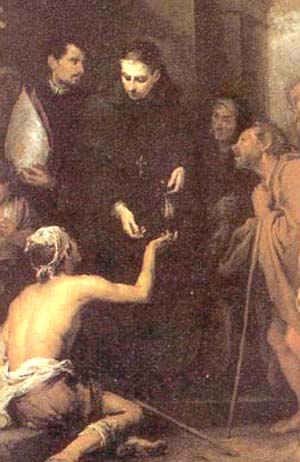
Comments of Prof. Plinio:
This is not a very easy selection to comment on since it primarily reports facts about St. Thomas of Villanova that are characteristic of many saints. They are admirable and praiseworthy, but a little too generic and repeat what we hear about the others. I limit myself, therefore, to comment on some more distinctive points here and there for our meditation.
First, it is remarkable the fact that Charles V chose St. Thomas of Villanova as a preacher and councilor. He was a person who in many ways directed the conscience of the Emperor. You see the finger of Divine Providence directing this great statesman.
Charles V, Emperor of the Holy Roman German Empire, a man over whose domains the sun never set, was an extraordinarily important man. He continued the vocation of the Hapsburgs of the House of Austria. There is a text by Mary de Agreda describing the designs of Providence for the House of Austria and all the graces God gave the Hapsburgs to fulfill them. It is very beautiful to see how Divine Providence assisted the realization of those designs by sending St. Thomas of Villanova to be the court preacher and councilor to Charles V.
Charles V, we must add with sadness, did not entirely correspond to those plans of God. He had a saint as a councilor, but he was a man whose softness and spirit of tolerance permitted Protestantism to expand in his lands. It is true that he had many different enemies to fight. One of them was the league formed by Muslim Turkey and Catholic France, which also became indirectly responsible for the expansion of Protestantism.
But Charles V had long periods of peace when he could have opposed the expansion of Protestantism. His famous temporizations have made him the subject of strong, objective critiques by Church historians.
But he ended his life well. He left aside all his possessions and goods and retired to a monastery as a penitent. He spent his last years there living a life that edified all Christendom. Did the good counsels of St. Thomas of Villanova finally move his heart? He used to say that St. Thomas had the gift of moving hearts. Did St. Thomas also bend his own heart of iron? It is a point to consider.
Someone could object: Why do you say that he had an iron heart? A man who makes concessions is a soft man and cannot be consider a man with an iron heart.
I would answer that long experience of life has shown me that nothing is harder to change than the heart of a soft man and make him an energetic man. It is harder to make a soft man energetic than to make an energetic man become soft. I think that a saint who could have made Louis XVI lose his softness would have performed a supernatural exploit greater than one who would convince Louis XIV to refrain from using force. So, the change of Charles V, who went to a monastery to make penance, may have been due to a good counsel of St. Thomas of Villanova.
Second, it is interesting to see that St. Thomas had so many ecstasies that he used to speak about them in his sermons. It is admirable to see how he reported, sincerely and nobly, without vanity, the manifestations of grace in his soul from the pulpit. Only a truly superior soul can do this because he understands that grace does not rely on his personal merit but only on the largesse of God.
This attitude is the opposite of a certain Calvinist way of understanding humility that has infiltrated many Catholic milieus. According to it, an individual is proud if he ever praises himself or lets someone else know of his qualities or gifts, because humility would always demand that he hide such things. This is not always true. It is a simplified picture.
I know, of course, that it can be dangerous to tell a person he can praise his own qualities. Often it happens that the person does not have an objective view of himself, but exaggerates his qualities and becomes proud. I know this, and I agree that we must be careful about encouraging this kind of pride.
But this is different from obliging everyone to hide his qualities in the name of humility. You can see in the life of St. Thomas of Villanova how he made a beautiful and natural manifestation of the graces he received and the marvelous things God did in his soul. He could talk about them even in a sermon because he was detached from them and was glorifying God alone, and not himself.
In the richness of the Catholic Church, we can find the models for both the rule, which is to be silent about one’s qualities, and also for the exception, which is to praise one’s own graces and qualities in order to honor God.
This is another beautiful facet of the life of St. Thomas of Villanova.









No comments:
Post a Comment